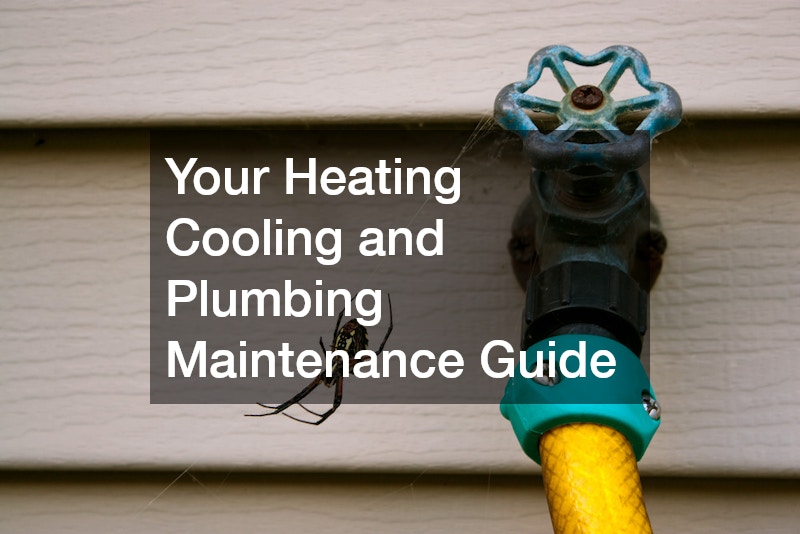In this comprehensive guide, we explore the essential aspects of maintaining your heating, cooling, and plumbing systems, all of which play a critical role in ensuring the comfort, efficiency, and safety of your home. Proper maintenance not only extends the life of your systems but also improves their overall efficiency, helping you save money on energy bills and avoid expensive repairs in the future. Whether it’s keeping your hot water systems in peak condition, ensuring your boiler system operates efficiently, or preventing costly repairs with routine checks, this guide will equip you with the knowledge and practical tips you need to maintain a well-functioning home.
A well-maintained home is not just about convenience; it contributes to a healthier living environment, better indoor air quality, and reduced risk of breakdowns or emergencies. Regular servicing and upkeep prevent problems from escalating, ensuring your systems are always running smoothly when you need them most. By staying proactive and making maintenance a priority, homeowners can avoid the frustration and financial strain of emergency breakdowns and unexpected repairs. Investing time and effort into regular checks and timely repairs creates a home that is not only more efficient but also more comfortable and cost-effective in the long run. This guide will empower you to take control of your home’s systems, helping you maintain a safe, efficient, and stress-free environment year-round.
How Often Should I Schedule Maintenance For My HVAC System?
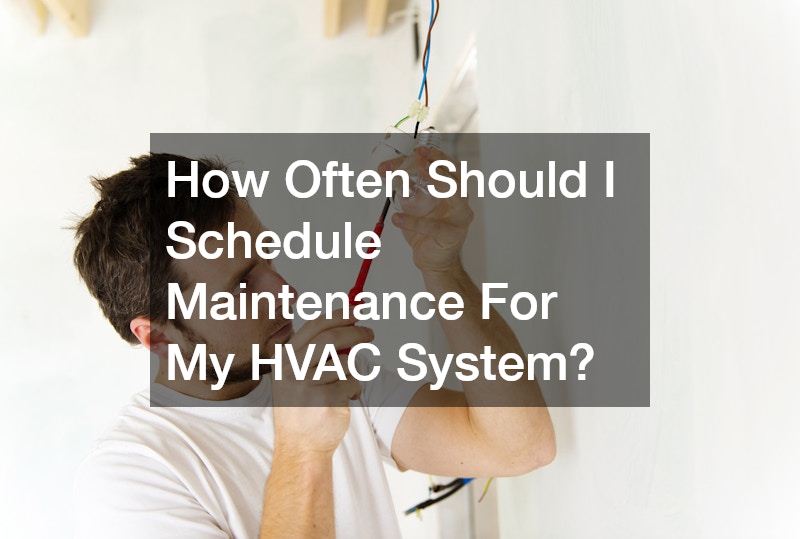
Importance of Regular Maintenance
Routine maintenance ensures your HVAC system remains functional and energy-efficient. A well-maintained system reduces unexpected breakdowns and extends the life of your heating and cooling equipment. Regular maintenance also enhances air quality in your home by reducing dust, allergens, and pollutants. Without scheduled maintenance, small issues can escalate into costly repairs, affecting both efficiency and comfort. Additionally, keeping up with maintenance helps ensure that your HVAC system operates at peak performance, reducing strain on components and lowering overall energy consumption.
Ideal Frequency for HVAC Check-Ups
Experts recommend servicing your heating and cooling systems at least twice a year—before summer and winter. This allows professionals to address minor issues before they become major repairs. Routine inspections help detect worn-out components, ensuring they are replaced before failure. Staying ahead of maintenance also helps with energy conservation, keeping utility bills under control. Moreover, regular check-ups can improve indoor air quality by keeping dust and debris from accumulating in ducts and filters.
Seasonal Maintenance Tips
Before the heating season, check your boiler system and ensure proper insulation. In summer, clean or replace air filters and ensure your cooling system operates optimally. Seasonal maintenance should also include checking for leaks in ductwork, testing carbon monoxide detectors, and calibrating thermostats. These small steps help improve system efficiency and overall home comfort. Additionally, inspecting outdoor units for debris buildup and ensuring proper airflow can prevent unnecessary strain on the system.
Signs That You May Need Maintenance Sooner
Unusual noises, inconsistent temperatures, and rising energy bills signal potential problems requiring professional attention. A musty smell or poor airflow can also indicate clogged filters or mold buildup, requiring immediate cleaning. If your system struggles to reach the desired temperature, it may be time for an inspection. Furthermore, frequent cycling on and off could point to underlying issues that need immediate diagnosis to prevent further damage.
DIY Maintenance vs. Professional Service
While DIY tasks like changing filters and cleaning vents are helpful, hiring a professional for thorough inspections and system tuning is recommended. Certified technicians can spot early warning signs and handle refrigerant refills, electrical connections, and deeper system diagnostics. A balanced approach combining DIY upkeep and professional servicing ensures optimal system health. In addition, professional servicing includes safety checks that can identify potential hazards, such as gas leaks or faulty wiring, before they become dangerous.
Creating a Maintenance Schedule
Develop a maintenance calendar to track regular servicing, filter changes, and inspections to ensure your system runs efficiently year-round. Keeping a log of maintenance activities also helps professionals diagnose potential problems during service visits. Setting reminders for seasonal tune-ups can prevent costly emergency repairs. Additionally, scheduling maintenance in advance can help you secure appointments during less busy seasons, ensuring timely service and uninterrupted comfort.
What are Common Issues with Heating Systems and How Can I Prevent Them?
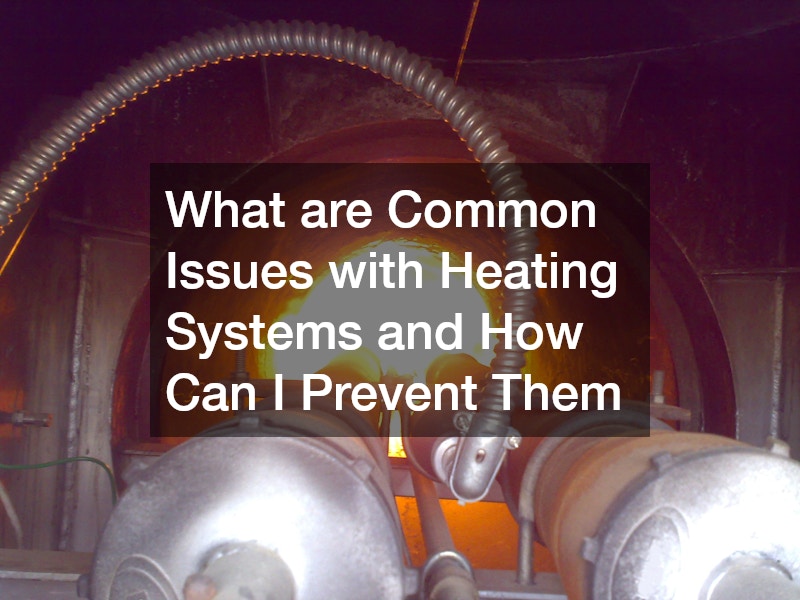
Understanding Your Heating System
Heating systems vary, including furnaces, heat pumps, and boiler systems. Knowing your system type helps with maintenance and troubleshooting. Understanding the fuel source, efficiency rating, and recommended service intervals allows homeowners to make informed decisions about care and upgrades. Different systems also require unique maintenance procedures to optimize performance. Familiarity with your system’s operation can help you recognize early signs of malfunction, preventing costly repairs in the long run.
Identifying Heating System Problems
Common issues include pilot light malfunctions, clogged filters, and thermostat issues. Prompt attention prevents major repairs. A lack of heat output or short cycling can indicate deeper problems that require professional assessment. Monitoring your energy bills can also help identify inefficiencies in your heating system. Other symptoms, like strange noises or unusual odors, can also signal underlying issues that might require immediate attention.
Routine Checks to Avoid Major Problems
Regularly check for leaks, unusual sounds, and fluctuating temperatures to catch issues early. Inspecting vents for blockages and ensuring proper airflow can prevent overheating or uneven heating. Keeping an eye on burner efficiency helps maintain consistent warmth throughout your home. Consistent maintenance also improves the overall lifespan of your system, reducing the need for expensive repairs or premature replacements.
Troubleshooting Heating Issues
Ensure your thermostat settings are correct, filters are clean, and air vents are unobstructed. If problems persist, consult a professional. Checking circuit breakers and gas valve settings can resolve some minor issues. If your heating system continuously turns on and off, it may need recalibration or repairs. Sometimes, electrical or mechanical failures could be the root cause, so a thorough inspection is necessary to avoid recurring issues.
Preventative Measures for Heating Systems
Schedule annual inspections, clean components regularly, and replace aging parts before they fail. Sealing duct leaks and insulating pipes can also improve efficiency and reduce heating costs. Ensuring proper ventilation around heating units prevents overheating and potential safety hazards. Routine maintenance, such as lubricating moving parts and checking for carbon buildup, also contributes to optimal system performance and reliability.
When to Call a Professional
While many small jobs, like a faucet repair, can be tackled with some basic DIY skills. However, If you experience frequent breakdowns or inefficient heating, contact a licensed contractor for inspection and repairs. Persistent gas odors or carbon monoxide alarms require immediate professional attention. Professionals have the tools and expertise to safely handle complex heating system issues. It is crucial to address issues like unusual noises or fluctuating temperature zones promptly to avoid further damage or risks to safety.
What Are the Best Practices for Cooling System Maintenance?
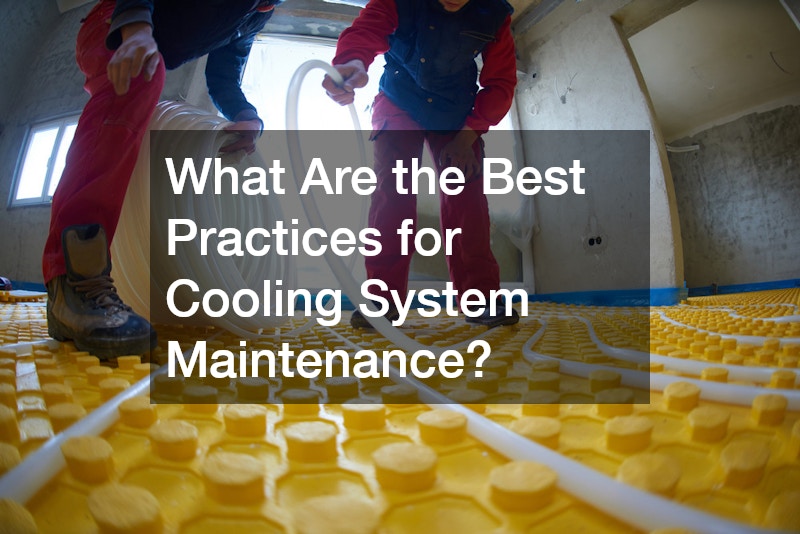
Understanding Your Cooling System
Air conditioners, heat pumps, and evaporative coolers are common cooling systems. Each requires specific maintenance routines. Knowing how your system functions helps you identify early warning signs of inefficiency. Regular inspections help ensure your cooling system runs smoothly throughout hot weather. Understanding the unique needs of your cooling unit can help extend its lifespan and reduce unexpected breakdowns. Familiarizing yourself with the manufacturer’s guidelines allows for proper troubleshooting when minor issues arise.
Importance of Air Filter Replacement
Replacing filters every one to three months improves air quality and efficiency. Dirty filters restrict airflow, forcing the system to work harder and consume more energy. High-efficiency filters can also reduce allergens, benefiting individuals with respiratory conditions. Additionally, regular filter changes help maintain optimal humidity levels inside your home, preventing mold growth and unpleasant odors. Choosing the right filter type for your system can further enhance indoor air quality and improve overall comfort.
Cleaning Coils for Efficiency
Dirty coils reduce cooling efficiency. Regular cleaning improves performance and extends system life. Accumulated dust and debris force the system to work harder, leading to premature wear. Keeping coils clean helps maintain consistent cooling output and lower energy costs. Failing to clean coils can also result in frozen evaporator coils, reducing the system’s ability to cool effectively. Scheduling professional maintenance can ensure deep cleaning of internal components that may be difficult to access.
The Role of Thermostat Settings
Setting your thermostat correctly helps reduce energy costs and system strain. A programmable thermostat ensures optimal temperature adjustments based on occupancy and daily routines. Smart thermostats provide remote control and automation for added convenience. Proper thermostat placement away from direct sunlight and heat sources helps maintain accurate temperature readings. Additionally, using energy-saving settings when away from home can lead to significant cost savings over time.
Avoiding Common Cooling System Mistakes
Neglecting maintenance, overworking the system, and ignoring minor issues lead to costly repairs. Running an air conditioner with dirty filters or blocked vents can cause overheating and compressor failure. Ensuring proper ventilation and airflow prevents unnecessary strain on the cooling system. Regularly checking for refrigerant leaks and unusual noises can help catch problems early before they escalate. Consulting a professional when issues arise can prevent further damage and prolong the system’s lifespan.
Effective DIY Cooling Maintenance Tips
Keep outdoor units clear of debris, check refrigerant levels, and inspect ductwork for leaks. Ensuring proper insulation around cooling lines prevents energy loss. Cleaning vents and ensuring the proper placement of outdoor units can also enhance system performance. Trimming vegetation around outdoor units allows for adequate airflow and prevents overheating. Periodically testing the system’s cooling efficiency ensures it’s operating at peak performance throughout the season.
General Advice & Tips
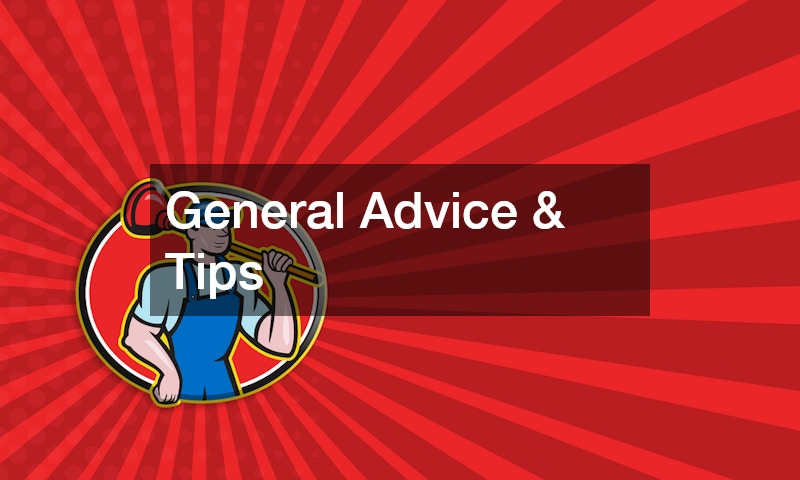
Addressing Water Pressure Problems
Water pressure fluctuations can indicate deeper plumbing issues. Low pressure might result from clogged pipes, while high pressure can strain your plumbing system. Regularly checking your plumbing system for leaks and buildup helps maintain optimal water pressure. Installing a pressure regulator can help prevent excessive wear on plumbing fixtures and appliances. If water pressure issues persist, consulting a professional plumber can help identify and resolve the underlying cause.
Drain Maintenance and Tips
Drain cleaning is essential for preventing clogs and backups. Regularly flushing drains with hot water and using enzymatic cleaners can keep pipes clear. Avoid pouring grease, coffee grounds, or other debris down your drains to prevent blockages. Using drain covers can help catch debris before it enters the pipes, reducing the risk of clogs. Performing routine maintenance on kitchen and bathroom drains can prevent unpleasant odors and costly plumbing repairs.
Knowing When to Replace Old Pipes
Old or corroded pipes can lead to leaks and water damage. Signs of aging pipes include discoloration in water, frequent leaks, and reduced water flow. If your home has outdated plumbing materials, consider hiring a general contractor for pipe replacement. Upgrading to modern piping materials, such as PEX or copper, can improve water quality and system durability. Regularly inspecting exposed pipes for signs of wear can help prevent major plumbing emergencies before they occur.
Final Thoughts
Regular maintenance of your heating, cooling, and plumbing systems is crucial for extending their lifespan and maintaining efficiency. By scheduling regular inspections, addressing small issues before they become major problems, and performing routine upkeep, you can significantly reduce the likelihood of unexpected breakdowns and costly repairs. From hiring a water heater repair company to ensuring proper drain cleaning, taking preventive steps will save you both time and money. Simple tasks like cleaning filters, checking for leaks, and inspecting your system’s overall performance can help avoid more significant damage in the future. Whether it’s annual sump pump installation or emergency sewer line repairs, a proactive approach ensures home safety, efficiency, and a more comfortable living environment.
In addition to plumbing and HVAC maintenance, integrating home fire protection measures enhances overall safety. Installing and testing smoke alarms, ensuring fire extinguishers are easily accessible, and keeping up with fire safety protocols all contribute to a safer home. By choosing qualified plumbers and reliable general contractors, you can maintain a smooth-running home that operates efficiently and effectively year-round. These professionals bring the necessary expertise and tools to handle various maintenance tasks, from complex plumbing issues to home remodeling projects. Trust Heating, Cooling, and Plumbing experts for all your maintenance needs, ensuring peace of mind and the assurance that your systems are operating at their best. Taking these steps not only protects your home but also enhances your quality of life by reducing stress and avoiding inconvenient disruptions.

